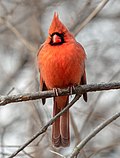Carotenoids (/kəˈrɒtɪnɔɪd/) are yellow, orange, and red organic pigments that are produced by plants and algae, as well as several bacteria, archaea,...
44 KB (5,282 words) - 02:45, 2 November 2024
Carotenoids are a class of natural pigments synthesized by various organisms, including plants, algae, and photosynthetic bacteria. They are characterized...
7 KB (854 words) - 02:44, 2 November 2024
Carotenoid isomerooxygenase (EC 1.13.11.65, ninaB (gene)) is an enzyme with systematic name zeaxanthin:oxygen 15,15'-oxidoreductase (bond-cleaving, cis-isomerizing)...
1 KB (134 words) - 13:26, 26 August 2023
Β-Carotene (category Carotenoids)
inherited condition of sunlight sensitivity. β-carotene is the most common carotenoid in plants. When used as a food coloring, it has the E number E160a.: 119 ...
34 KB (3,541 words) - 22:37, 9 October 2024
hemoglobin, myoglobin Light-emitting: luciferin Carotenoids: Hematochromes (algal pigments, mixes of carotenoids and their derivates) Carotenes: alpha and beta...
32 KB (3,908 words) - 20:24, 18 April 2024
Lycopene beta-cyclase (redirect from Carotenoid beta-end group lyase (decyclizing))
with systematic name carotenoid beta-end group lyase (decyclizing). This enzyme catalyses the following chemical reaction carotenoid ψ-end group ⇌ {\displaystyle...
3 KB (358 words) - 14:48, 26 August 2023
Prolycopene isomerase (redirect from Carotenoid isomerase)
CRTISO, carotene cis-trans isomerase, ZEBRA2 (gene), carotene isomerase, carotenoid isomerase) is an enzyme with systematic name 7,9,7',9'-tetracis-lycopene...
2 KB (278 words) - 15:32, 26 August 2023
Carotenoid complexes are physical associations of carotenoids with other molecules. Carotenoids are hydrophobic molecules that are usually coupled with...
36 KB (4,002 words) - 05:40, 17 June 2024
Lycopene (category Carotenoids)
Neo-Latin Lycopersicon, the name of a former tomato genus) is a bright red carotenoid hydrocarbon found in tomatoes and other red fruits and vegetables. Aside...
28 KB (2,693 words) - 22:37, 17 September 2024
retinal. Carotenoids that do not contain the β-ionone moiety cannot be converted to retinol, and thus have no vitamin A activity. Carotenoids are the precursors...
10 KB (815 words) - 05:17, 18 March 2024
a benign and reversible medical condition where an excess of dietary carotenoids results in orange discoloration of the outermost skin layer. The discoloration...
14 KB (1,568 words) - 20:57, 2 July 2024
Carotenoid oxygenases are a family of enzymes involved in the cleavage of carotenoids to produce, for example, retinol, commonly known as vitamin A. This...
6 KB (642 words) - 20:31, 23 May 2024
Apo-beta-carotenoid-14',13'-dioxygenase (EC 1.13.11.67 is an enzyme that catalyzes the chemical reaction 8'-apo-beta-carotenol + O2 ⇌ {\displaystyle \rightleftharpoons...
2 KB (237 words) - 15:21, 26 August 2023
Orange carotenoid protein (OCP) is a water-soluble protein which plays a role in photoprotection in diverse cyanobacteria. It is the only photoactive protein...
27 KB (2,907 words) - 18:30, 28 December 2023
includes retinol, retinyl esters, and several provitamin (precursor) carotenoids, most notably β-carotene (beta-carotene). Vitamin A has multiple functions:...
108 KB (12,499 words) - 06:04, 23 October 2024
Lycopene epsilon-cyclase (redirect from Carotenoid psi-end group lyase (decyclizing))
with systematic name carotenoid psi-end group lyase (decyclizing). This enzyme catalyses the following chemical reaction carotenoid psi-end group ⇌ {\displaystyle...
2 KB (156 words) - 14:48, 26 August 2023
CRT (genetics) (category Carotenoids)
the biosynthesis of carotenoids. Those genes are found in eubacteria, in algae and are cryptic in Streptomyces griseus. Carotenoid synthesis is probably...
14 KB (1,384 words) - 22:01, 14 June 2024
Carotene (category Carotenoids)
coloured dietary carotenoids to colourless retinoids, such as humans and chickens, have yellow-coloured body fat, as a result of the carotenoid retention from...
23 KB (2,691 words) - 14:32, 5 October 2024
Paprika (section Carotenoids)
The red, orange or yellow color of paprika is due to its content of carotenoids. Peppers, the raw material in paprika production, originated from North...
17 KB (1,616 words) - 05:49, 12 September 2024
Carotenoid 1,2-hydratase (EC 4.2.1.131, CrtC) is an enzyme with systematic name lycopene hydro-lyase (1-hydroxy-1,2-dihydrolycopene-forming). This enzyme...
2 KB (162 words) - 13:26, 26 August 2023
the males is produced from carotenoid pigments in the diet. Coloration is produced from both red pigments and yellow carotenoid pigments. Northern cardinal...
33 KB (3,590 words) - 18:56, 30 September 2024
This is always associated with a massive increase in the accumulation of carotenoid pigments. The conversion of chloroplasts to chromoplasts in ripening is...
11 KB (1,344 words) - 15:19, 29 August 2024
from the phytochemicals picrocrocin and safranal. It also contains a carotenoid pigment, crocin, which imparts a rich golden-yellow hue to dishes and...
70 KB (7,822 words) - 15:30, 1 November 2024
[clarification needed] AdoCbl can modulate carotenoid genes, which confer warm colors onto various plants. Carotenoid transcription is activated by sunlight...
5 KB (341 words) - 19:07, 25 March 2024
The roseate spoonbill's pink color is diet-derived, consisting of the carotenoid pigment canthaxanthin, like the American flamingo. The roseate spoonbill...
19 KB (1,889 words) - 03:42, 20 September 2024
the carotenoid is obtained. There is a positive correlation between the chromas of the tail and breast feathers and body condition. Carotenoids play...
106 KB (12,422 words) - 22:00, 1 November 2024
Spheroidene monooxygenase (redirect from Acyclic carotenoid 2-ketolase)
Spheroidene monooxygenase (EC 1.14.15.9, CrtA, acyclic carotenoid 2-ketolase, spirilloxantin monooxygenase, 2-oxo-spirilloxanthin monooxygenase) is an...
2 KB (190 words) - 15:51, 26 August 2023
yellow dye. The pigments of the erect tagetes are due to the presence of carotenoids, of which the main one is lutein, which is associated with the prevention...
19 KB (2,144 words) - 01:37, 31 October 2024
Astaxanthin (category Carotenoids)
Astaxanthin /æstəˈzænθɪn/ is a keto-carotenoid within a group of chemical compounds known as carotenones or terpenes. Astaxanthin is a metabolite of zeaxanthin...
29 KB (2,687 words) - 17:43, 13 October 2024
produces 23 times more carotenoids than golden rice (up to 37 μg/g) because psy gene of maize is the most effective gene for carotenoid synthesis, and preferentially...
38 KB (3,979 words) - 15:20, 18 August 2024




















